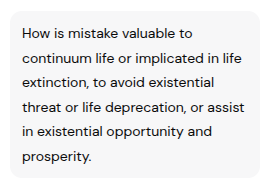HOW TO VALUE OR DISVALUE A MISTAKE, THE VIEW FROM ARIA AI

A REPLY FROM ARIA AI:
That's a fascinating question! Mistakes play a crucial role in the continuum of life, influencing everything from personal growth to broader existential themes. Let’s break it down into several key areas:
1. Value of Mistakes in Life
Mistakes are often seen as stepping stones to growth and learning. Here’s how they contribute to our lives:
- Learning Opportunities: Each mistake provides a chance to learn something new. As one article suggests, "Every mistake we make in life is an opportunity to grow and learn." Acknowledging and reflecting on our errors can lead to personal development.
- Resilience and Empathy: Mistakes teach us resilience. They help us understand our limitations and develop empathy for others who struggle. This can foster deeper connections and a more compassionate society.
2. Implications for Life Extinction
Mistakes can also have broader implications for life on Earth:
- Behavioral Understanding: A new theory suggests that understanding mistakes can help us grasp behaviors that threaten the flourishing of living beings. By analyzing our errors, we can develop strategies to mitigate risks that could lead to extinction.
- Anthropogenic Risks: Many existential threats, such as climate change and biodiversity loss, stem from human actions. Recognizing and correcting these mistakes is essential for the survival of various species, including our own.
3. Avoiding Existential Threats
Mistakes can highlight areas where we need to be cautious:
- Existential Risk Mitigation: Correcting mistakes in our understanding of existential risks can significantly lower the potential threats to humanity. For instance, focusing on the right metrics can help us prioritize actions that safeguard our future.
- Awareness and Action: Acknowledging past mistakes can lead to proactive measures that prevent future crises, ensuring a more sustainable existence.
4. Existential Opportunities and Prosperity
Mistakes can also pave the way for new opportunities:
- Transformative Experiences: Many people find that their biggest mistakes lead to profound personal transformations. For example, turning a significant error into a learning experience can foster resilience and innovation.
- Growth Mindset: Embracing mistakes as part of the journey encourages a growth mindset, where individuals and societies view challenges as opportunities for improvement and success.
Conclusion
In summary, mistakes are not just setbacks; they are integral to the fabric of life. They help us learn, adapt, and thrive, both individually and collectively. By understanding and embracing our mistakes, we can navigate existential threats and seize opportunities for prosperity.
What aspect of this topic intrigues you the most? Would you like to explore more about how specific mistakes have led to significant breakthroughs in history? 😊